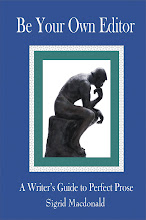When I asked my teacher, Mr. Cotton, "What is the purpose of life?" this is the answer I received.
Note two things about that sentence. One, the word
that proceeds the question and the question mark is lowercased. That's because
the phrase "What is the purpose of life?" is still part of a larger
sentence, even though it is a complete sentence and can stand on its own
normally, but in this instance it is only half of the sentence. "This is
the answer I received" is the other half and we need it to make our point.
Two, there is no comma after the question mark. A version of our example which
includes the comma is wrong, e.g., When I asked my teacher, Mr. Cotton,
"What is the purpose of life?," this is the answer I received.
Fortunately, your spellcheck will probably pick up the
second issue and flag it as a problem; however, spellcheck may incorrectly tell
you that you want to capitalize any word after a question mark. Don't do it
automatically; do so only if it is not part of a larger sentence and that
includes dialogue. ("Is the purpose of life to love and be
loved?" she asked. No caps for the pronoun and no comma after the
question mark.)
Sigrid Macdonald is an author and an editor. You can
find her at http://sigridmacdonald.blogspot.com/


